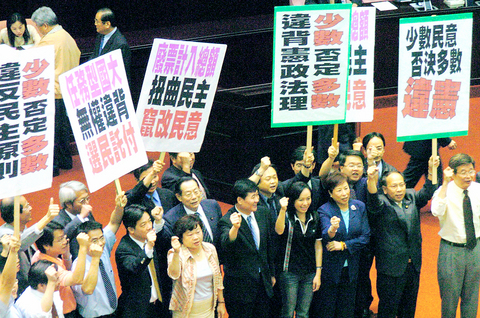The Democratic Progressive Party (DPP) legislative caucus yesterday said it would request a constitutional interpretation from the Council of Grand Justices, after the legislature struck down its proposition to reconsider part of the statute governing the operation of the National Assembly.
The move, however, is believed to have more political meaning than concrete significance, as a constitutional interpretation is time-consuming, and is unlikely to be resolved before the assembly meets at the beginning of next month.
The opposition-dominated legislature yesterday voted 124 to 87 against the DPP's motion to review two articles in the Law on the National Assembly's Exercise of Power (

PHOTO: SEAN CHAO, TAIPEI TIMES
A second vote also rejected the DPP's proposition, with 123 of the lawmakers voting against and 87 in favor. Holding placards reading "minority vetoing the majority, unconstitutional" and "oppose including invalid votes in the total number of votes," DPP lawmakers made a futile effort to call on opposition lawmakers to endorse their cause.
The legislature passed the law last Friday, which requires a three-quarters majority vote for the passage of constitutional amendments and stipulates that ballots cast by assembly members failing to toe their party's line should be dubbed "invalid," yet still be counted anyway.
The DPP caucus sought to overturn the article regarding the ratification threshold for constitutional amendments, hoping to lower the bar from 75 percent to a simple majority. It also wished to exclude invalid ballots from the total number of votes.
Following the DPP's failure, the law will proceed to the Presidential Office, where President Chen Shui-bian (陳水扁) is required to promulgate the law within 10 days after receiving notification from the legislature. In a bid to ensure the success of the constitutional amendments, DPP caucus whip Jao Yung-ching (趙永清) said that assembly members representing the DPP who fail to toe the party's line will be expelled and immediately replaced. His party will also request a second round of voting.
Jao also called on the Chinese Nationalist Party (KMT) to follow suit. In response, KMT caucus whip Chen Chieh (陳杰) said that his party was not a subordinate of the DPP and would not dance to its tune.
However, he pointed out that KMT Chairman Lien Chan (連戰) had made it clear that assembly members representing the party that defy it's stance on constitutional amendments would be ousted.
Chen also said that his caucus respects the DPP's will to request a constitutional interpretation because it is none of its business. People First Party (PFP) caucus whip Lee Yong-ping (
"I have no idea why it risks its credibility for such a short-lived piece of legislation," she said. "Besides, I'm wondering why it did not say anything about the law when it was passing the second and third readings, but then flip-flopped after it passed into law."
If any legislation can be amended simply because of the opposition voiced by one individual, Lee said, anybody can ask the lawmaking body to revamp any law if he threatens to recall the president. Lee was referring to former DPP chairman Lin I-hsiung (林義雄).
Also see story:

Taiwan is gearing up to celebrate the New Year at events across the country, headlined by the annual countdown and Taipei 101 fireworks display at midnight. Many of the events are to be livesteamed online. See below for lineups and links: Taipei Taipei’s New Year’s Party 2026 is to begin at 7pm and run until 1am, with the theme “Sailing to the Future.” South Korean girl group KARA is headlining the concert at Taipei City Hall Plaza, with additional performances by Amber An (安心亞), Nick Chou (周湯豪), hip-hop trio Nine One One (玖壹壹), Bii (畢書盡), girl group Genblue (幻藍小熊) and more. The festivities are to

Auckland rang in 2026 with a downtown fireworks display launched from New Zealand’s tallest structure, Sky Tower, making it the first major city to greet the new year at a celebration dampened by rain, while crowds in Taipei braved the elements to watch Taipei 101’s display. South Pacific countries are the first to bid farewell to 2025. Clocks struck midnight in Auckland, with a population of 1.7 million, 18 hours before the famous ball was to drop in New York’s Times Square. The five-minute display involved 3,500 fireworks launched from the 240m Sky Tower. Smaller community events were canceled across New Zealand’s

‘SLICING METHOD’: In the event of a blockade, the China Coast Guard would intercept Taiwanese ships while its navy would seek to deter foreign intervention China’s military drills around Taiwan this week signaled potential strategies to cut the nation off from energy supplies and foreign military assistance, a US think tank report said. The Chinese People’s Liberation Army (PLA) conducted what it called “Justice Mission 2025” exercises from Monday to Tuesday in five maritime zones and airspace around Taiwan, calling them a warning to “Taiwanese independence” forces. In a report released on Wednesday, the Institute for the Study of War said the exercises effectively simulated blocking shipping routes to major port cities, including Kaohsiung, Keelung and Hualien. Taiwan would be highly vulnerable under such a blockade, because it

UNDER WAY: The contract for advanced sensor systems would be fulfilled in Florida, and is expected to be completed by June 2031, the Pentagon said Lockheed Martin has been given a contract involving foreign military sales to Taiwan to meet what Washington calls “an urgent operational need” of Taiwan’s air force, the Pentagon said on Wednesday. The contract has a ceiling value of US$328.5 million, with US$157.3 million in foreign military sales funds obligated at the time of award, the Pentagon said in a statement. “This contract provides for the procurement and delivery of 55 Infrared Search and Track Legion Enhanced Sensor Pods, processors, pod containers and processor containers required to meet the urgent operational need of the Taiwan air force,” it said. The contract’s work would be